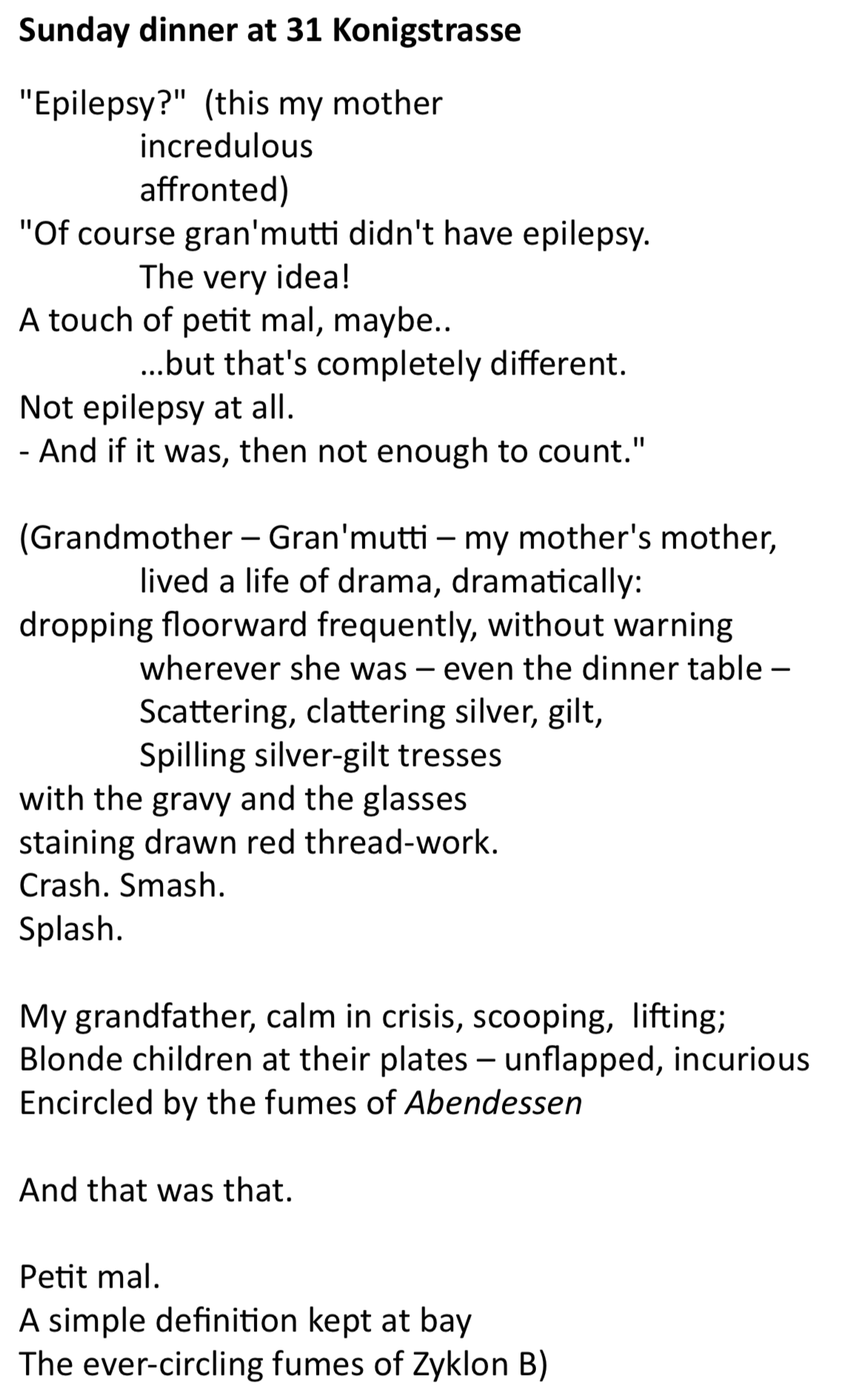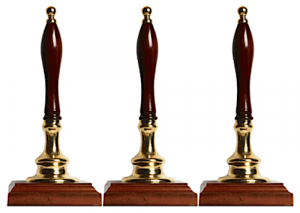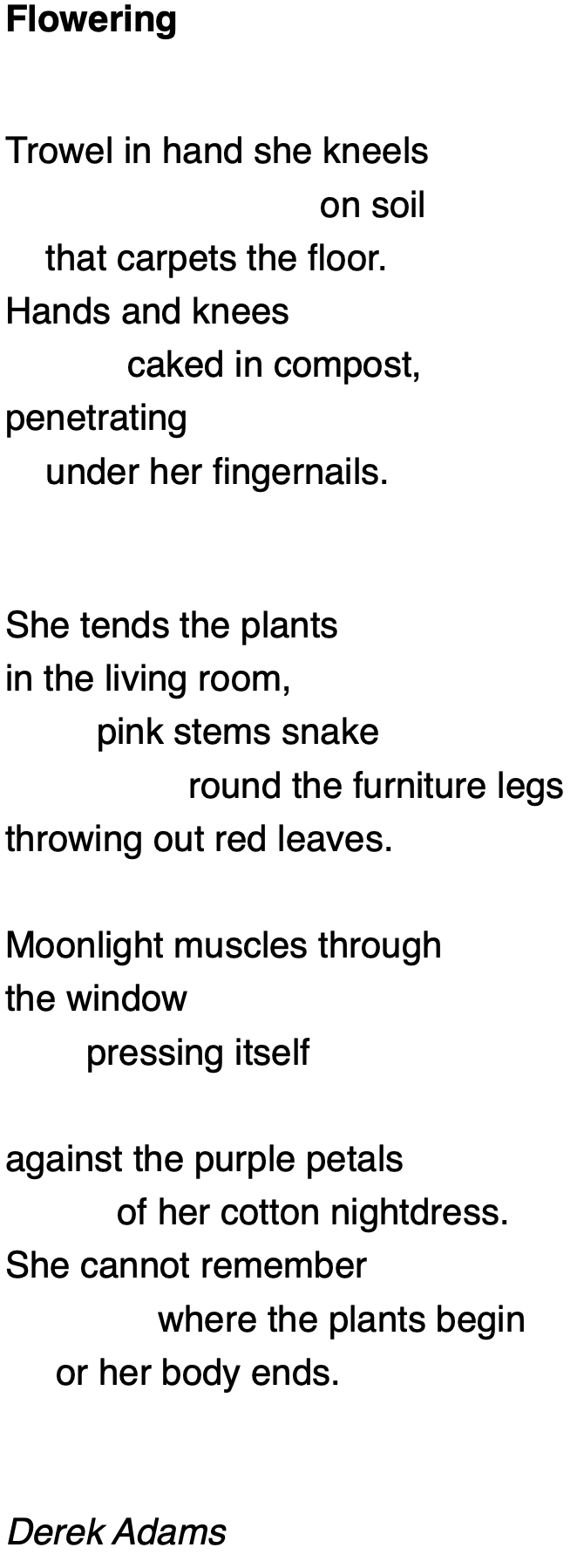Suffolk Poetry Society will be sharing work from their membership with us over the coming weeks with a new poem around every three weeks. www.suffolkpoetrysociety.org
Stephanie Feeney
I was born in Louisiana, and raised in Texas. My poems have been published by The Poetry Review, Ink Sweat & Tears, and anthologised by Fish Publishing. I grew up in a family of fishermen, musicians and drinkers, and still dabble in all three. These days, I call Suffolk home. The poem ‘La brucatura’ won third prize in the Crabbe poetry competition 2023.
La brucatura
Each night, he packs away the ladder, bucket,
rake, but leaves the nets. They make a skirt
that girds the whole of Tuscany. Each day,
I take you to see the thing that mothers
and babies and farmers see — the sun
before it rises. You scrabble in the pastel dust,
staining your mouth, fingers, clothes, toes with the juice
of fallen olives. He catches us one morning.
Smiles. Lets you play at taking olives in and out
of his bucket. We hang close like dogs, hungry
every morning to watch him comb the fruit
from the trees, fearing, like dogs do, his going,
which happens, of course, when the harvest is done –
a poor one, he says. It looked so rich to us.
Stephanie Feeney
Jane Henderson
Jane Henderson has lived in a Suffolk village for over 20 years, where she is a gardener and sculptor. Often her ideas hatch whilst gardening and some develop into poems. Her work has been published in magazines and anthologies. Her poem ‘ Demeter’s Footprints’ was commended in Suffolk Poetry Society’s Crabbe Poetry Competition 2023.
Demeter’s Footprints
Poppy thief, I go out with intent –
a plastic bag and daisy grubber,
planning the route, to take the spoils
not far from home, the transpiration
on a hot evening. I’d seen the red
spectacle in the field with vetch
and fancied this blood red splash
on the black barn fence. I probe
the sandy soil and pull the milky
tap root like a tooth, checking
there is no-one else about. Each
I filch has just one flower but, oh,
the promising buds, dangling
pods abrim with crimson dreams,
abrasive to the touch, and pent,
perhaps, with something else,
like grief, held back, not yet burst,
waiting to vent. And I get them home
without delay, slit some openings
in my gravelly substrate, heel them
in, gush water in my desperation
to keep them, hoping their tap
roots will find anchor here, will hold
them safe, that the fecund pods
erupt and come and come again.
J. Henderson.
Roger West
Poet, songwriter, performer. Former front man for various punk bands with several LPs to his name. Writes in English and in French and translates poetry from/via French. Now concentrates on writing longer pieces which he performs with electronic soundscapes and live music at international poetry festivals.
The poem ‘City State of Athens: Policy document for the preservation of the Ship of Theseus’ won second prize in Suffolk Poetry Society’s Crabbe Poetry Competition 2023.
City state of Athens:
Policy document for the preservation of the Ship of Theseus
1 Uplift the nails.
Extract the nails one at a time, keeping the structure in place.
Melt down the metal to make ammunition to use against the demonstrators.
2 Uplift the decking.
Take up the planks one at a time, replacing each one with a replica.
Use the wood to make coffins for those killed by government troops.
3 Uplift the sails.
Take down the sails one at a time, replacing each one with a replica.
Use the cloth to make shrouds for the dead.
4 Uplift the rigging.
Take down the masts one at a time, replacing each one with a replica.
Cut the masts into poles to make handles for the pallbearers.
5 Uplift the oars.
Take out the oars one at a time, replacing each one with a replica.
Shape them into tools to dig the graves.
6 Consider:
Now is it still the Ship of Theseus?
7 Scrub and scour the surfaces to get rid of the memory of the abused and abandoned women:
7.1 Ariadne
7.2 Phaedra
7.3 Hippolyte
7.4 Antiope
7.5 Helen of Troy
7.6 Anaxo
7.7 Periboea
7.8 Aegle
7.9 Peregune
7.10 Xenodita
Roger West
Nicola Warwick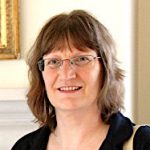
Nicola Warwick’s pamphlet Naming the Land was shortlisted for the 2023 New Angle Prize and her latest publication, The Human Portion, is on the shortlist for the Poetry Category of the 2023 East Anglian Book Awards. ‘Grace Poole’s version’ took first prize in the 2023 Crabbe Memorial Poetry Competition.
Grace Poole’s version
She brought the fire with her,this bird of paradise
aching for the tropical heat of her childhood.
She lived in her own fierce darkness,
her desires jungled and unkempt.
She loved the lick of flame on kindling.
She had lovely hair, once,before she grew it coarse
and loose as an animal’s mane.
My feral girl, she wanted it knotted and twisted,
a mad-eyed Rapunzel burning for her prince.
I kept her safe, in her goblin cell,sang out at night to mask
her screams, kept her calm when the master came
to stir her up.
When he didn’t come, her hands were claws
on my skin, her teeth needles
to spike me.
I tied her to the chair to quiet her.
Still, she loved him. I watched the softening
of her eyes at his footstep on the stair, the smoothing
of her voice in the flicker of his candle-flame
beneath the door.
She warmed herself with the heat of knives,
her wildness kindled by the green wood
of his cold, English heart.
She was ablaze with want of him,
even in her torn and tattered state,
believing her ragged dress was as fine and pure
as a wedding gown.
Nicola Warwick
Caroline Gilfillan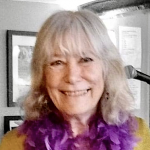
Caroline Gilfillan has published five collections of poetry. She won the Yeovil Poetry Prize in 2019, and her collection Yes, was judged best poetry book in the East Anglian Awards. Her collection Hail Sisters of the Revolution, with photographs by Andrew Scott, was published in 2022. She’s also a novelist.
‘My Grandmother Visits the Father She Has Never Known (1883)’ came third in the 2022 Crabbe competition.
My Grandmother Visits the Father she’s Never Known (1883)
I was nine going on ten, coughing up
globs of phlegm, when Mother dragged me,
shivering, on the train from Whitburn
to an Edinburgh New Town house with windows
tall as horses and a surgeon’s plaque on the wall.
When asked why we’d come here, instead of going
to the quack in our town, she shushed me,
rang the bell and told me to watch my manners.
When we entered the surgeon’s room, my head
went into a spin, for the place smelt of wood, cigars,
hair oil – fine things that didn’t find their way
into the house where we boarded. He ran cool
fingertips round my jaw and pressed the chilly kiss
of a stethoscope to my chest before pronouncing
that I’d live. His eyes, I noticed, were brown as peat,
the lashes long. He had fine, grey whiskers.
Handing Mother a bottle of cough medicine
he said, stern, didn’t she have something warmer
to dress me in, something that fitted properly?
And what about a pair of boots that didn’t leak?
At this, she ordered me in a voice sharp as her
sewing scissors to wait outside. Through the door
I’d left open a crack I watched her hands
go on to her hips, heard the hiss of her whisper,
and the words, not enough. Red-cheeked,
he pulled a wallet from his jacket pocket.
Mother snatched a bundle of notes from him
and rushed me out of the front door.
Hurrying to the station, she insisted it was the wind,
cold as a butcher’s knife, making her eyes water.
Caroline Gilfillan
Pat Jourdan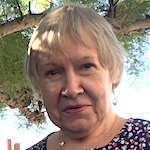
Pat Jourdan is mentioned in Ian McEwan’s Saturday as “a little-known but gifted poet of the Liverpool school…” She trained as an artist at Liverpool College of Art. Recent poems in Orbis, Ink, Sweat & Tears, PoetryCooperative, Spilling Cocoa with Martin Amis. Seventh poetry collection Citizeness 2015 and fifth novel Ultramarine 2021.
The poem Milton’s Daughters had an honorary mention in the 2022 Crabbe competition.
Milton’s Daughters
Education – to turn a woman into a dictionary – Rilke
We handle the amazing revelations
carefully scripting out
stutters, rants, and speculations.
In his tyranny we have learned to turn a thought
through its 360 degrees.
His stately plod goes on.
We accept our father’s blind rule
because it pays the rent.
Outside is spanned with bad weather, hunger, homelessness.
So, we transmit his rages,
all of us in thrall
but unlike monastic scribes
we are free to scribble in the margins,
can silently deviate from his blindness.
We have no choice but to be invisible,
pen-pushers, translators, copyists.
We are the women already turned into a dictionary.
Our lives are ceilinged with stars, walled with cedar,
mostly in charge of jams and groceries.
Three other daughters will appear
under a northern sky.
They will pay our legitimate price.
They will dare to write it down.
Pat Jourdan
Sara Impey
Sara is primarily a textile artist specialising in stitching text on to fabric. She has been writing poetry on and off for the last 15 years and has had her poems included in the Crabbe Competition three times. The following poem ‘Glimpse’ received an Honourable Mention in the 2022 Crabbe competition.
Glimpse
It was my son, scrolling through clips
of Coggeshall, who spotted her.
A four-minute film: the market, 1993.
It takes a moment to locate her
in the crush around the stall.
But we can’t mistake her back view,
her stripy top in white and blue,
the movement of her shoulder
as she slips her purse out of her bag.
The camera pans away too soon –
then we catch her profile, close-up,
top-left, between the dangling
garlic and bananas, just a
fleeting frame or two, only seen
when someone steps aside.
It’s twenty years since she died.
But this morning she is simply alive,
simply there, no more aware of the lens
than of us watching now on our screens.
She will return home to my father
for a lunch of soup and breadrolls
and coffee in those Sixties’ mugs
in speckled stoneware
which I still have.
Sara Impey
Philip Röel Baker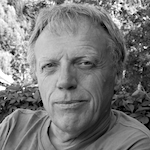
Philip Rösel Baker is of mixed European heritage – English, German, Polish, French. He lives in a barn in the Suffolk hamlet of Edwardstone, with its lively community and its dark starlit skies. His poetry has been published in anthologies and in the New European.
Shelling Broad Beans
Green canoes with pointed prows,
stern raked upwards,
bulging keels.
Vessels of plenty.
Serpentine pods, specked with red.
Pale green light, transfusing
through veined skin.
Emerald membrane, sleeping bag.
Swelling beans like bare limbs
contoured beneath a sheet.
Suspended animation,
in cushioned white amniotic velvet.
Break the pointed tip,
unzip the strings the full length
of the spine –
call them awake.
Slip the beans from their soft uterus,
leaving behind yellow filaments,
delicate afterbirth.
Soft-centre pebbles, newborn.
They know nothing
but do they sense the sudden
change in the light,
a shock of colder air?
A colander of
mangled bedclothes. Aftermath
of struggle.
Plundered.
Broken canoes
piled in a scrapyard, ripped,
abandoned
to decay.
A bowl of jade-green
slitted pearls, containing
next year’s spring.
Live protein booty.
Philip Rösel Baker
David Healey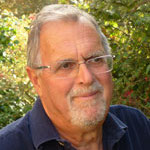
Since retiring as a GP in Suffolk I’ve been learning how to be a patient. Might it have been better the other way round? The poem ‘Paced’ was written after I had a cardiac pacemaker fitted in Ipswich Hospital and tries to evoke the disorientation and mixture of anxieties about oneself and one’s loved ones under the influence of sedation. It’s as if I had a dream about my procedure instead of it actually happening.
PACED
Cocooned under a blue drape,
I feared the worst, wondering
if I’d ever return for a cup of tea
and worrying you’d be scared
it had taken so long, our dog Polly
left alone and unfed at home,
your phone storing missed calls.
There was much more rummaging
around than I ever expected.
Firstly, the pacemaker generator
wouldn’t fit below my collarbone.
Then, one of the leads, they tried
to get round a difficult bend,
they couldn’t screw into my heart.
Successful at last, the effects
of my second dose of Fentanyl
kicked in. Eric, my cardiac nurse,
played piano music by Einaudi.
Angels in pyjamas were wheeling
me to an empty slot in the sky.
Faces smiled down from above.
You were waiting, as if I’d gone
off somewhere and you’d spent
hours looking for me, only to find
I was in the next room and hadn’t
told you. Nothing new, then.
Under the sheets, I felt you
searching for my missed beats.
David Healey
Roger West
Poet, songwriter, performer. A punk long before and long after it was fashionable. Scottish by origin, European by inclination. Writes in English and in French and translates poetry from/via French into English. Performs at festivals in France, the UK and the US, accompanied by live musicians and electronic soundscapes.
The poem ‘ They beheaded my father this morning’ won second prize this year in the Crabbe poetry competition.
They beheaded my father this morning
They beheaded my father this morning.
Someone filmed it on their i phone and downloaded to youtube.
Someone else sent me the link.
I watched it on the subway on the way in to the office,
knowing it’ll barely get a mention on the evening news.
They beheaded my father this morning.
The wicker basket lined with a checked cloth.
Afterwards the warden knelt to gather the four corners
and knot them together
and bore the parcel gently away like a gift for his fairytale grandmother.
They beheaded my father this morning.
People came out from the market to watch.
When it was over they went back to their shopping,
filling their baskets with tomato, yam, marrow, papaya.
They beheaded my father this morning.
His work finished, the executioner drank his coffee in a nearby cafe.
Unmasked now in anonymity
but still recognisable by his stench.
They beheaded my father this morning.
And now I have to write to let people know.
I hesitate over which verb to use:
the functional ‘beheaded’,
the more classical ‘decapitated’
or the unspecific ‘executed’,
but opt in the end for something befitting the casual brutality.
They chopped my father’s head off this morning.
Now who will drive my poor mother to the funeral?
Roger West
Sue Wallace-Shaddad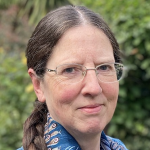
Sue Wallace-Shaddad is Secretary of Suffolk Poetry. She particularly enjoys writing poetry about art. Sue has a short collection of poems about Sudan published by Dempsey and Windle ‘ A City Waking Up’. The poem Deja Vu was commended in the 2021 Crabbe poetry competition.
Website; www.suewallaceshaddad.wordpress.com
Déjà vu
After L’Eclisse by Michelangelo Antonioni
The back gate has seen it all before —
click of turning heel
backward glance in a mirror
the set of her blonde hair.
Its hinges complain,
clack — the gate snaps shut.
She exits his avant-garde,
the tilt of her head framed.
Her steps put distance between them.
It’s unclear if she plans to return.
An anxious fan whirrs,
pivoting on its stand
the ashtray newly shattered —
fag ends dust the floor.
✶
Fag ends dust the floor —
the ashtray newly shattered.
Pivoting on its stand,
an anxious fan whirrs.
It’s unclear if she plans to return.
Her steps put distance between them.
The tilt of her head framed,
she exits his avant-garde.
Clack — the gate snaps shut,
its hinges complain.
The set of her blonde hair,
backward glance in a mirror,
click of turning heel —
the back gate has seen it all before.
Sue Wallace-Shaddad
John Vaughan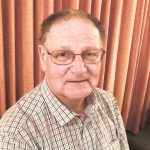
John Vaughan went along to an evening class in 2003. It was so different to that at school; one could say he caught the poetry bug. He then took a degree in Creative Writing to learn more and now writes for the joy and fun of it.
The poem, Collection, was commended in the Crabbe competition 2021.
COLLECTION
She said she liked a man with a hobby.
I said I could tick that box.
So when the Soviet T 34 tank arrived
I took down the fence at the back:
the tank fits quite nicely on what
had once been the vegetable patch.
Later a British Challenger 2 came on
the market. I demolished the double garage
and replaced the flower beds and magnolia
with concrete. Admittedly the tank blocks out
our sunlight but there’s some compensation.
Its camouflage provides greenery 24/7.
I’ve now seen an advert for a German tank,
the World War 1 A7V Sturmpanzerwagen.
It could go in our living room but she’s not keen.
I don’t know why – I’ve done the measurements.
I’ve re-assured her that nothing will have to change
that much – the television can sit on its turret.
John Vaughan, April/May 2020

Anne Boileau
Anne Boileau
Anne lives in Essex and observes and writes about that county’s ancient landscape, history and wildlife. She studied German in Munich and worked as translator, interpreter and language teacher. She translates German poetry for pleasure and has written a novel about Katharina Luther and the German Reformation.
REMEMBERING THE BURREN
‘It is the peculiar power of flowers that while they are universal
and spread their species over the world, they invoke in each beholder
the dearest and most treasured memories.’
The Small Miracle by Paul Gallico.
Stunted hawthorn hedges lean away
from chill prevailing winds – day after day
gales hit full force the towering Cliffs of Moher
two hundred metres of limestone, layer on layer.
White-maned mustangs leap on the rocky shore,
guillemots nest on ledges, fulmars soar.
If I had wings I’d fly in the teeth of this gale,
ride on the up-draught, defying rain and hail.
But we, being earthbound, denied the gift of flight,
walk down to Doolin, the safety of clints and grikes;
lie on a sun-warmed rock now in the shade
and sleep. On waking, look! A common twayblade!
Cranesbill, rock rose, thrift and mountain avens;
spring gentian, shrubby cinquefoil. A very heaven.
Anne Boileau
Rob Lock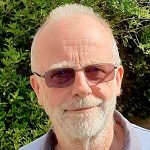
For twenty years, Rob Lock has benefitted from membership of the East Suffolk Writing Group as well as the Suffolk Poetry Society and Bury St Edmunds’s poetry café. He cherishes having had his work described as ‘alive with both love and the ordinary, with warmth and depth… levity never far away.’
‘The Brickie’s Prayer’ was commended in the 2020 Crabbe Poetry Competition.
The Brickie’s Prayer
Lord of the monk, the Sussex and the double Flemish bond,
the stretcher, header, soldier and sailor,
the shiner and the rowlock too,
Lord of the half bat, three quarter bat
and occasional queen closer,
Lord of the single leaf wall, of all cavities and ties,
let this building be good for three centuries or more.
Grant it sympathetic beds and borders,
dignified neighbours and vistas that remain unspoiled.
May it never give rise to subsidence or other Buildings claims,
and, Lord, forgive any who here bind themselves in husbandry,
any here committing to housewifery,
should they call it theirs while they are passing through.
Rob Lock
Jen Overett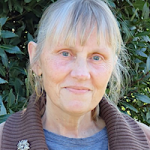
Jen, a retired social worker, combines her love of poetry with local disability and environmental campaigning and volunteering at the John Peel Centre. Mainly writing on themes of family and responsibility, her poems have been recognised in competitions by Suffolk Poetry Society, the Wolves Literary Festival, and Grey Hen Press.
Jen Overett’s prose poem ‘ I let the sun’ which was commended in the Crabbe poetry competition in 2021.
I let the sun
I find the Love of my Life and let everything reduce to a slow simmer, the sun’s rays spread through a whole sleepy morning from bed to rug, my summer skirt soft against my thighs. Before I know it, he’s tripping over babies, taking exception to soup bowls, dry-sculpting anger, as the babes and I retreat into the tool shed, where the smoke from our bonfire burns up the grass, windows tantalise on their hinges. Perhaps it’s one thrown bowl too many, one ordinary tea-cooking-on-the-camping-stove Friday afternoon, or it’s finding the rags of my skirt replacing the burnt lid of my mother’s tubed-up ashes and the resultant chemical changes, for just out of nowhere my arms grow wide enough to gather up the infants, my lips soft enough to whisper hush. The trouble with escaping is the way babies can’t wriggle free of their horrors, scraps of blue bowl dread in wild dreams, slash and crash of metal on wood, the sun a world away. We’re all still breaking free with our bare hands. Frankly, a roof strut cutting the monster neck of love or finding the wild beast hanging from the tree outside the kitchen, exuberantly dead amongst the cherry blossom, are both far lower on my bucket list than finally, getting us out of this damn tool shed.
Jen Overett
Sara Impey
Sara Impey is a textile artist who specialises in stitched text. A former newspaper journalist, she enjoys playing with words on paper and on fabric.
Sara was commended in the 2021 Crabbe competition with her poem ‘Birch Airfield Composting Centre’
Birch Airfield Composting Centre
We were drawn to its other-worldliness,
this field, back in the seventies.
My brother shot a spoof Cold War film
in the empty fen-flat bleakness,
with the runways arrowing into mist
and history sealed in its concrete slabs.
Now, in the featureless winter wheat
a planetscape has landed, whole,
an out-of-scale model of sci-fi scenery.
Un-Essex hills steam with Martian miasmas,
a microbial brew of prunings, uprootings,
clippings and trimmings,
the maceration of trees:
a season’s leftovers slow-casseroled
into peaks of tilth.
Dinosaur diggers bite into the mounds
or roller-skate robotically
round a rink of brown rime.
Hi-vis Lego men, tiny humanoids,
dwarfed by mountains of mangled greenery,
comb the foothills for plastic shreds.
Dodging past potholes of composted soup,
our trailer bumps up the ramp to be weighed.
‘Half a ton of your best, sir,’ you say,
stuffing a tenner in the cashbox’s mouth.
The digger roars broadside, blocking the sky.
An invisible god in his towering cab
sends a black cloudburst thundering down,
part missing his target, but nobody cares.
We shovel the spills for the hungry garden.
This was always a place of transit and change.
We rumble back on the crumbling strip
where pilots once took off to a real war.
Sara Impey
Eleanor J. Vale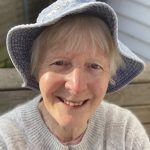
Eleanor J Vale’s love of poetry is encouraged by being with other writers. Her pamphlet Think of Something Else was published in 2016 by the Garlic Press; she won the Grey Hen Poetry competition in 2019. and this poem won 2nd prize in the 2021 George Crabbe Poetry Competition.
Half-term week by Eleanor J. Vale
Monday Tuesday Wednesday Thursday all ticked off,
and it’s Friday. I’m on the train watching for Farncombe
because if I miss it I’ll end up in Guildford
and Auntie Mina will not be there to meet me –
but there she is in her Jaegar mustard coat
and her lipstick cheeks, wrapping me in kisses,
telling me that Uncle Claude has been sent
home from work this very morning not well.
When we reach her semi detached
with the flowery front and vegetable back,
her sister Margaret-who-never-wanted-children
is in the kitchen, busy, bossy, cross, saying
we have to understand CLAUDE IS VERY ILL.
Mina is cross back,
NONSENSE HE’S AS STRONG AS AN OX.
Uncle Claude, dear kind Uncle Claude, is upstairs,
still waiting for the doctor, pacing the landing,
can’t get comfortable, face as grey as his soft v-neck pullover.
I am sent away with Auntie Margaret.
On Saturday we visit the zoo
where the sadness of elephants makes me cry.
When we get back to her flat
the black telephone is ringing,
ringing too loudly for the size of the room.
Eleanor J. Vale
Diane Jackman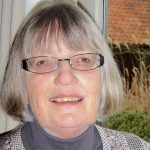
Diane Jackman’s poetry has appeared in small press magazines and anthologies in US and UK. She has won or been placed in several competitions. Starting as a children’s writer she now concentrates on poetry, often inspired by place or rural themes. She runs a poetry café in Brandon, Suffolk. The poem Leaving Kangeq was Highly Commended at the 2021 Crabbe poetry competition.
Leaving Kangeq
The workers went first,
into processing factories,
once trawlers shovelled up the fish.
Wives and children followed.
With three families left,
the store ceased trading,
the priest was moved to a bigger parish,
the Government cut the power cable.
The name
of Kangeq
was rubbed out
of the record.
In the capital, new apartments
offered heat and light and water,
in a maze of concrete.
No one spoke our language.
Grandfather still dragged meat home
from market on his sled,
hauled it up three flights of stairs,
to the mocking laughter of our neighbours.
The sea was far, far from us.
Men who had been fierce hunters,
paddled their kayaks through ice floes,
found no place here, lost their way.
Diane Jackman
Cro Page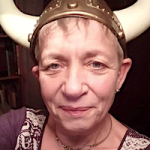
This poem won Cro third prize in the 2021 crabbe poetry competition.
“When I realised (early on) that I experienced the world differently to others, I kept my secret, terrified by the unknown – until learning it was a family secret, known to generations.
I started writing to try convey the heights of delight, depths of despair, and the sheer strangeness of life given to us with temporal lobe epilepsy. This poem came from pondering how easily I could never have existed.”
Cro Page
Nicola Warwick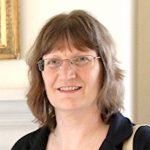
Nicola Warwick was born in Kent but has lived in Suffolk for most of her life. She has published two collections of poetry and her work covers a range of subjects including nature, history and folklore. She has an MA in Creative Writing from the Open University.
Colony Collapse Syndrome
After the first month, she stopped paying the bills,
wrapped herself in moth-chewed layers,
shivered in the dark.
She lost colour without heat and light.
The house opened like a cave
ready for what might come in.
Bats roosted in cornices.
Mice and silverfish scuttled over
the bare floor at night.
She netted her hair with spider silk
to keep it out of her eyes, became
a queen of wings and shadows.
At night, fox cubs played on the stairs.
Sometimes, she felt the bristles
of their young snouts.
She laid trails of sugar water to draw in
the specialists. Her house filled with bees
who droned serenades,
brought offerings sticky with nectar.
She lay on a mattress on the floor,
allowed them to worship her.
Nicola Warwick
Anthony Johae
Antony Johae is a member of the Suffolk Poetry Society and has published three collections: Poems of the East (Gipping Press, 2015), After-Images: Homage to Éric Rohmer (Poetry Salzburg, 2019), and Ex-Changes (The High Window, 2020). Antony has taught in Africa and the Middle East and now divides his time between Colchester and Lebanon. He is working on Lines on Lebanon.
The poem ‘From Bruges to Brubeck’ was commended in the 2018 Crabbe poetry competition.
From Bruges to Brubeck
It was grey autumn on Flanders’ flats;
colours did not stand out, nor sharp city lines
give shape to what Van Eyck had seen.
No shadows led early walkers west
nor followed in the slow evening
– and when Belfort bells rang out, I thought I heard
a kind of Liebestod, prelude to the hour.
I wandered lonely in a drizzle with the crowd
past Sint Gilliskerk, on up to old St. Jacques
and at Sint Anna saw racked Jesus peeling in a niche
yellow notices pinned dog-eared to a board
soggy moss lining the pile’s footings
the church a mass of bricks ready for cement
The West Door shut.
I took flight from the rain in a gallery:
Monique de Rae’s ‘Blue-Eyed Lady’
but saw only a dog centered in every picture
signifying such a life, I thought;
then passed from museum to museum:
Groeninge, Gruuthuse, Volkskunde, and Lace,
but felt no beating heart.
The rain easing, I saw them as I turned a canal corner,
four musicians on a platform ready to play –
and when they started, the clouds seemed to separate
to the rhythm of their raggy waltz
the light giving rhyme to their riffs
to the piano’s counterpoint
to the sax’s syncopations
the bass man’s fingered time
the swish-swish of percussion brushes
– and with it, the city took on
its lost colour, staggering line,
and I could see through Van Eyck’s eyes again.
Antony Johae
Peter Sandberg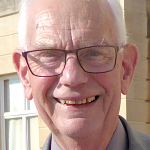
I have been writing poetry since 2009 through locally run courses, read regularly with Sudbury Poets. and have had 3 commendations in Crabbe Poetry Competitions, with a number of poems published in connection with other projects. In January 2020 I published To Bind us to the Earth, details from hethersett1@outlook.com.
UNTAMED MELODY
I can’t download the wind,
can only stream it’s surge
within the narrow bandwidth
between my ear and brain,
or feel it sweep my skin
like a drummer’s brush caressing hide,
or sense it thrumming to a rhythm
that tempers to my heartbeat.
No stave can tame the wind
in tadpole blots on paper
like swallows perched on wires;
the seed of music germinates
in air. So who will play a part
whose shape is wind and heart is fire
as swallows flicking through the gale
or swifts supported on the air?
Peter Sandberg. November 2017
Ivor Murrell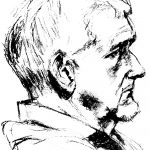
A working life, with experience as a maintenance engineer, a sugar industry trouble shooter, a maltster and finally as Director General of the Maltsters Association of Great Britain. As Suffolk’s last traditional floor maltster he gave an IAA Town Lecture on the subject in March 2019.
Since retiring Ivor Murrell has found more time for his writing, has achieved a BA Hons Humanities degree with the Open University and has been Chairman of The Arts Society East Suffolk.
Ivor Murrell website: www.versifier.co.uk
‘Last Orders’ won a ‘Commended’ award in the 2016 George Crabbe Poetry Competition. The competition judge, Moniza Alvi, wrote of ‘Last Orders’ “Tragic and hard hitting, I found this poignant poem compelling.” ” This is a poem with a real sense of urgency”.
Last Orders
Every night at seven, he shed the family skin
took off the shirt he had worn one day
washed at the kitchen sink in his vest,
the clean shirt ironed and waiting.
Not once or twice a week, but every night
he took his pristine presence to the pub
to buy and sell, or swell to sycophants,
his fat wallet earning him a throne.
He never knew his family’s evening life
wife and children watched his every exit,
the woman waited his return, alone.
He was never the worse for drink, nor better.
Sometimes he cooked a lonely midnight meal,
a selfish extension to solitary pleasures,
a skill he rarely used when the sun was up,
always curt on the creed of ‘wife’s duties’.
I map my childhood by the pubs he used:
first the Shepherd and Dog in Sicklesmere Road
where he left me one night in the car for hours.
The Rutland Arms, The Rushbrooke Arms,
The Coach and Horses, where he charged me
the cost of his petrol to drive my friend home.
‘The Moody’ at Hawstead, where I cycled
and was told never to seek him there again.
That was his last order, I took him at his word.
Memories are names of public houses.
Ivor Murrell
André Mangeot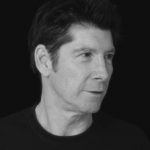
André Mangeot’s published collections are Natural Causes (2003), Mixer (2005) and Blood Rain (2020) along with two books of short stories, A Little Javanese (2008) and True North (2010). For over ten years he was a member of the poetry ensemble The Joy of Six which performed at many festivals across the UK.
www.andremangeot.com a.mangeot1@gmail.com
Sunburn
300 feet above the castle keep
500 higher
than the 40 miles of Irish Sea
becalmed with glitter
held between these wide-spread arms
today we’ve climbed and clung
with ragged sheep
on 1-in-3’s of straggling walls
and gorsy paths to reach
Garth Bach –
this dizzy ledge halfway to heaven
swaying breathless
in an ocean light that sweeps
from Bardsey Sound to Barmouth
and beyond
a sheen so bright
it’s hard to fathom such a view
or see how castle, beach and bay
don’t simply drop away like milk-blue
spindrift into space.
We’ve come from way down there –
rock-pools to remind us
of all those small and madder leaps
we fear must pass like this day’s brilliance –
wind and light that only now I see
suffused in you, so burnt into your skin
you’ll carry always from this hill
the hours when
just by stretching out our arms
we seemed to hold the world,
to touch the sun.
André Mangeot
Margaret Seymour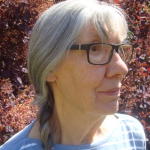
Margaret Seymour grew up in the North East but has spent most of her adult life on or near the Norfolk coast. She has written poetry since childhood though her career path has been in art and art history. Since joining various writing groups she enjoys the fellowship and stimulus this brings.
Latin Lovers
Salvador Dali gets around: one moment
he’s attached to a wall can-opener
next he’s back on the washing-machine.
In the drawer he lies on the Sigmund Freud
mouse mat. Its syncretic charisma
challenges his own: both finger-puppet
and fridge magnet, he’s an archetype
of dissociative identity disorder. He’s drawn
to Frieda Kahlo. You find them back-
to-back, their black velour craniums
conjoined. It takes two hands to separate them.
She looks good in red, flowers in her hair.
He’s chic in high white collar, striped tie.
Her eyebrows respond to his signature
moustache. They will not kiss.
Margaret Seymour
Nina Roffey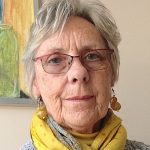
Nina writes: I have written poems all my life and at 21, after my father’s death, I found poems he had written to my mother during the war, so maybe I get it from him. Runaway describes a true event when I was 15-16 years old and my home life was rather dysfunctional.
‘Runaway’ was commended in the 2016 Crabbe poetry competition.
Runaway
Once, I ran away from home.
Ordinarily, I would have
taken my little brother.
His small hand in mine
Saxon curls beside me.
We would walk hand in hand
down a road into the sunset,
catch a train to happiness
where he could play
and not be called clumsy or noisy.
This time I would have to leave him.
I kissed his small face, whispered sorry,
left him sleeping.
Listening, I heard their voices
stoking fires, before slipping
out the window into August night.
Here, I became the shadow that
I knew I was. A grey thing
without footsteps.
The night smelled of cut wheat,
stubble rasped in a rhythm
of leaving.
Past the mere,
its clear face towards the sky
where a non Catholic
could have slept
easily under its covers.
About the second mile,
each step hammering the knowledge
home that I wouldn’t really go.
A small hayfield, a hay cart bed
with starlight throw,
I waited until I had the emptiness
to return unseen.
Nina Roffey
Derek Adams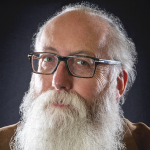
Derek Adams is a professional photographer, living in Suffolk. He has an MA in Creative and Life Writing from Goldsmiths. His most recent collection is EXPOSURE – Snapshots from the life of Lee Miller, (Dempsey & Windle 2019)
Derek Adams’ poem ‘Flowering’ was commended in the 2018 Crabbe poetry competition.
Angela Locke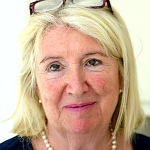
Angela Locke www.angelalocke.co.uk grew up in Ipswich, as a child in Cardinal Wolsey’s house in St. Nicholas Street. At 15, she was ‘adopted’ by the Suffolk Poetry Society who encouraged her poetry. Angela lives in Cumbria, where she was Writer-in-Residence on Hadrian’s Wall. She has had five poetry collections published.
Angela Locke was commended in the 2018 Crabbe poetry competition for her poem ‘Making Up’
Making up
So the sweet–faced cows come down,
and it is almost done.
The man, bent after the day’s work,
pulls hay from bales, its scent holding him
in last summer’s place.
Bare bulbs spill light into the yard;
the stink of shit, the lowing and clattering of beasts.
Cows lean with patient eyes, sucking water.
It is their pleasure, each movement a meditation;
wise or unwise, they are considering the day.
Hay falls into racks, a rattle of nuts into troughs,
their own soft breath smelling of grass.
Now, all’s done, truly done, made up,
he can leave behind his tools of toil, rough boots
clarted with mud, sacks of feed, out of reach of rats
in the concrete store, tired old forks.
It’s not yet Spring, but in the window,
lit for supper, a bunch of tulips,
red against the lamp
Angela Locke
Richard Whiting
Richard Whiting has been writing poetry for most of his life, but has been pursuing the craft seriously for the past decade. He is a twice commended poet in the George Crabbe Memorial Poetry Competition and has published a pamphlet of poetry entitled Natural Histories.
That Perfect Feeling*
The news bulletin disappears,
its breath smelling of apocalypse.
Even the sky seems sad,
as if the seasons themselves
were suspended.
And then a brimstone flitters
across a verge. Sun pulls
apart the clouds
as the first real warmth of Spring
settles on my face.
Blue sky reveals two buzzards
drawing circles, one around the other,
cracking mews across the valley.
The radio sends out a length of guitar,
to join them
the musician
seeming to follow their flight,
picking out their progress along the fret,
and they to mirror his mood,
a synchronicity.
The song is over. Two distant buzzards
melt into cloud, the radio falls silent.
I was dreaming, attending the only festival
I shall catch this year, up there, suspended
briefly by a chord.
*from Like A Hurricane by Neil Young
Richard Whiting.
Roger West
Poet, performer, songwriter – a punk long before and long after it was fashionable. He writes in French and in English, pursuing the thought in whichever language it presents itself. He translates poetry from/via French to English and performs regularly at festivals in France, the UK and US.
Titian puts down his paintbrush and picks up his guitar
mussel shell tuna fin cuttlefish ink
pyrite powder azurite zinc
cerulean celadon cadet and celeste
crows wing gull feather robin egg ravens nest
midnight diamond byzantine slate
imperial prussian palatinate
the heart of the spark at the heart of the flame
ferrocyanide blood in the vein
kingfisher starfish silver lake and capri
peacock periwinkle anemone
indigo aqua ultramarine
french fig and damson and aubergine
cornflour columbine lapis lazuli
indian ocean mediterranean sea
ice cap polar night magnetic ash
rock salt and cobalt thunderbolt flash
berber and breton ceylon and chartreuse
jesuit sacristan la vierge douleureuse
turquoise and teal tiffany true
woke up this morning, baby, I had all of those blues
yeah, woke up this morning, I had all of those blues
all of those blues
Roger West
Nicola Warwick
Nicola Warwick was born in Kent but has lived in Suffolk for most of her life. She has published two collections of poetry and her work covers a range of subjects including nature, history and folklore. She has an MA in Creative Writing from the Open University.
Her poem Spring Tide was commended in the Crabbe poetry competition 2019.
Spring Tide
This can’t be the place.
Water is a glossy strip in the distance,
the line between sky and sea.
A tide that has ebbed too far,
doesn’t know when to stop,
this wanderer
who might never come back
like the barely-there footprints of children
scuffing the sand,
this participant in salty tantrums,
snatcher of cliffs, masher of houses to driftwood.
I’m on edge; want to call it in,
reel it back, summon the moon:
come in, come home
all is forgiven.
All is forgiven.
come in, come home.
Summon the moon, reel it back:
I’m on edge; want to call it in;
snatcher of cliffs, masher of houses to driftwood,
this participant in salty tantrums,
scuffing the sand
like the barely-there footprints of children
who might never come back.
This wanderer
doesn’t know when to stop;
a tide that has ebbed too far,
the line between sky and sea.
Water is a glossy strip in the distance.
This can’t be the place.
Nicola Warwick
John Prior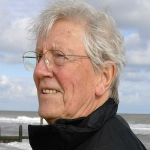
John retired to Suffolk and has had a few poems published. These days he enjoys the company of friends in ‘Poetry Aloud’ in Bury St Edmunds. Much of his inspiration comes from the small village of Wyverstone that he lives in. ‘Eating English’ was inspired by a neighbour.
The poem was commended in the 2019 Crabbe Poetry competition.
Eating English
Jeremy takes a Continental breakfast,
uneasy at the state of things.
He’s queasy reading the news.
Despairs at distress in the middle spread.
His croissant crumbles, sticks in his throat
‘It’s the labels,’ he says. ‘The labels. The labels.
It ruins our digestion.
We should all be eating English.’
‘Oh Jerry my sweet, Oh Jerry my love
Remember the dust in Avignon,
The sitting outside, the wine, the sun
And the rough sheets in the afternoon.’
He sips at his coffee.
Looks across the crumpled cloth
‘It’s not the same at all,’ he says.
No, she thinks. Not the same at all.
John Prior
Fran Reader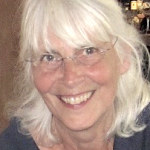
Born in Essex, Fran Reader has lived in Suffolk since 1990. After retiring from a career in gynaecology she reinvented herself through her love of poetry by gaining an MA in Poetry with the Open University (2019). Since Autumn 2017 Fran has been Editor of Suffolk Poetry Society’s Twelve Rivers magazine. The following poem was commended in the Crabbe Poetry Competition 2020.
Working fresh weft over old warp
I saved a tapestry from moth destruction the way one saves a soul
Louise Bourgeois, diary entry, November 2 1995
Warp – strange name.
I’ll make it my word-of-the-day
to please Maman.
She’ll give me a linen backdrop of taut threads
exposed by greedy moths
with no thought for beauty –
a free-for-all in dust-making decay –
a lost face, a missing fleur-de-lis.
For her I’ll restore the missing weft with woollen threads –
tannin fixed, to madder-red, weld-yellow and woad-blue.
Over-and-over I’ll let the soft threads
stroke my fingers – colour retell the story.
When I’ve finished I’ll sing – if sound will come –
a song for the warp I’ve buried.
Copyright. Fran Reader
Tim Lenton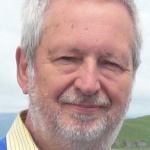
I have been writing and performing poetry since the turn of the century, starting with the poetry/visual arts collective Inprint. I won the Fish International Poetry Prize in 2007. I live in Norwich but am linked mainly to the Seagull Theatre group in Lowestoft and the Halesworth Swan poets.
‘Young Birds’ by Tim Lenton which was highly commended in the Crabbe Poetry Competition 2020.
Young Birds
Light flashes in the hedge
as young birds
free from the fields
taste the edges of their new world
then come to feed from our fingers:
sunlight pierces their wings
and the puzzle of leaves and branches
as we watch,
remembering Columba
the holy dove
and the flames of light
that settled on him, filled his house
full of love and secrets,
consuming the dry, tender land.
Copyright © Tim Lenton
Jane Henderson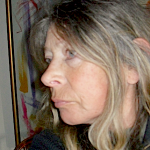
Jane Henderson has lived in a Suffolk village for 22 years, where she is a gardener and sculptor. Often her ideas hatch whilst gardening and some develop into poems. Her work has been published in magazines and anthologies. ‘Frank’s World’ was placed second in the 2020 Crabbe Poetry Prize.
Frank’s World
Frank was a knitted boy: plain and purl,
with a spare hand that attached
a harmonica to the slot of his mouth
which he then assumed like a silver grin,
harping through it a language of his own.
His face was pure purl, the curve of ear,
the tilt of brow, the prow of lips kiss-pursed.
Frank’s mother had cast him off the row
like unwanted stitches, and Frank had felt
himself so cast, falling with weight yet silently
with the gravity of a tightly spun ball of,
for example, Aran, there being a slight
bounce and a degree of unravelling.
Frank then grew independently, breeding
his own ideas like stick insects and wheeling
them around on the velvet nap of caterpillars.
Frank was sweater and shorts, scratchy
grey above stocking-stitch knees, long
frayed from forays into the hedge where
the thrush nested. Frank’s spare hand
had plumbed the thrush’s nest, fingered its
rough weft, felt the yarn in its rotundity.
Otherwise he stood with his toes curled
around stones in the soft silt of the river bed,
the cloudy water knee high and dough warm,
tightening his toe grip on the stones,
and all the time sliding the mouth harp.
He wanted to banish the frightful images
of cauliflower that kept creeping into his head,
the vegetable having been served to him
once for school dinner. He had fled down
the lane away from school, back to his bed
at Granddaddy’s house. In his dreams
the heavily textured white curd pulsed
like a huge brain, then broke in half,
exuding a glaucous substance from its parts.
All Frank wanted to taste was the wood,
the metal of the harmonica, he blowing
and sucking at the honeycomb grid of it,
meting out his vernacular of stickleback,
blackbird’s egg and Granddaddy’s pipesmoke.
Granddaddy was braces and clay-smeared spade,
drawing long-necked tear-inducing leeks
from the sod of his allotment.
Somehow Frank had a notion that blind, black
men played blues on harmonicas, so Frank
shut his eyes when he struck up his mouth harp
and focussed on the hue of the blackbird’s egg.
Copyright © Jane Henderson 2020
Mike Bannister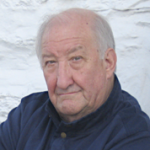
Chair of Swan Poets Halesworth. Fascinated by Humanity, Literature, Landscape and History, Mike sees Poetry (Language, Time, Imagery and Metaphor) as a way of sharing a sense of Heritage and Community. Publications: Greenstreet Fragments 2003, Pocahontas in Ludgate 2007, Orinsay Poems 2012, Late Poems 2017 Nine Days 2019.
Mike won third prize in the Crabbe poetry competition 2020 with this poem;
Lament for a Lewis Crofter-Man
(i.m. Kenny Kennedy of Orasaigh 1943-2016)
Further… as far as… back of the north wind
we hanker after recollection’s warp,
where the last crags tumble, chill dark
and terrible to the underworld.
Prince, whale-man and weaver, lone voyager,
we came to re-discover you.
Malin to Fair Isle: twelve windless days,
all mute, no shout carries, no echo tells;
the sharp steel barb of that, salt rust and sore
drives deep.
Unrippling, at Orasaigh waves gleam
green and silver, mirror those mornings
we’d put out on the ebb tide, trusting
the flood to bring us home, lines coiled, fish box full.
You taught us the sea; hidden skerries
lee shore, whistling squalls, a cable parted,
a readiness for danger.
Lifelog of a crofter-man: Handsome youth
quits the Long Isle, earns his spurs
where the whale-fish blow, about the Weddell Sea;
then he’s a tanker-hand
Thames Humber Tyne and Forth.
In the high woods of Moray, he finds his own
pearl beyond price, brings her home,
builds a small Ithaca, clear spring, rough land
dry boat, iron loom; they work, weave tweed,
raise a constellation of four lambent stars.
Restless, down all the seasons and the years,
our quiet Odysseus, is busy at the brim
of the sea, a godly man, each repeated
labour a ritual in itself, a prayer almost;
fish of the tide, cloth of the loom
peat of the moor, stag from the hill.
Sage thoughts, uttered in the old tongue,
soft and slow; he would provide.
Boatman, friend, hero and hunter, sleep sound
in your dark school among the stones
of Gravir, place of kings.
Copyright © Mike Bannister 2020
Sue Wallace-Shaddad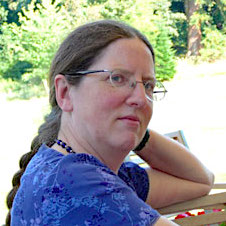
Sue was born and brought up in Suffolk and returned to live in the county 15 years ago after many years abroad with the British Council. She retired in 2014 and is now Secretary of Suffolk Poetry Society. Sue has had poems published by The Dawntreader, Ink, Sweat and Tears and in several anthologies.
In the video Sue reads three poems from her new collection, A City Waking Up. This video also appears in the IAA Arts in Celebration event.
Elizabeth Cook
Elizabeth Cook was the winner of the Crabbe Poetry Prize 2020 with her poem ‘Memory House’.
Elizabeth Cook lived in Suffolk until earlier this year and hopes to return. She writes fiction (Achilles, Lux) and poetry. Her second full poetry collection, When I Kiss the Sky will be published by Worple next year.
Memory House
When nouns – proper and common –
began to go, she remembered
Giordano Bruno,
his memory theatres
by means of which an orator
might recall the propositions
of a speech, and place sentences
in key positions such as a pediment,
architrave or column within
an imagined theatre.
She would use
her childhood home
which she could not shake off
and adorn it with entities
and situations
of greater fragility –
fireplace, kitchen sink, flagstones
in the larder; coal cellar,
woodshed, the kitchen
window where the cat
came in. The bookcase
on the upstairs landing –
she would tie what she wanted
to remember to these solid
locations as some tie prayers
and wishes to a tree, making the
fastening firm with a double bow.
There. The name of a long ago lover
tied to the mantelpiece, and there
the town in Sardinia where someone
– was it she? – fell over and grazed
her knee as a child might do
and the woman from the cake shop
ran out with a chair and a slice
of a tart made with apricots
ranged beautifully
like roof tiles.
Copyright © Elizabeth Cook 2020
Photo: Peter Everard Smith
Elizabeth Bracken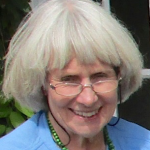
Born and brought up in the Waveney Valley, Elizabeth studied English at
Lancaster University. She is actively involved in Suffolk poetry cafes and
workshops and has won a couple of local prizes. Elizabeth has published
two collections, Unhurried Voices (2012) and Appreciating the Place (2017).
HIS HEAD DON’T ACHE ANY MORE
– the chap who hammered this in,
my father gasped
drawing the nail, thick with rust,
clinched to sound wood
in the back of the barn
where cobwebs drooped with dust.
He does not know the smell of sun on corn.
His tongue no longer tastes the rasp of beer
nor do his ears resound to climbing larks.
No hands find warm round flesh beneath coarse cloth,
nor eyes make out the running of a hare.
Gone, with the hum of privies,
raw hands in frost, sour bread,
a child”s sob of pain,
and the sight of a small rough box
carted through the churchyard gate – again.
Elizabeth Bracken
5/2002
James Knox Whittet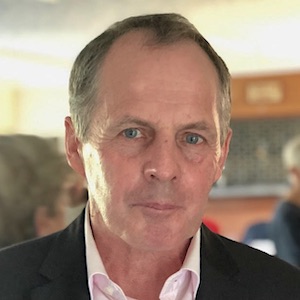
James Knox Whittet was born and brought up in the Hebridean island of Islay. He has published poetry collections and won awards from the Arts Council of England, Highland Arts and the Society of Authors. He is a Hawthornden Fellow and was President of the Suffolk Poetry Society
Languages of Babyle
It is always in autumn that I glimpse you,
walking hand in hand with Donalda
along the esplanade in Oban, past the cathedral
with its organ notes made discordant by sea winds.
Across the bay, the spaced lights of Kerrera
burn more brightly with the deepening dusk;
as you slowly walk, you listen to the gulls’
strangely human cries of exile and longing.
Images of autumn flooded your mind like
the high tides of Babyle where your languages
were confused by humans and not by God:
that unbending figure in whom you could never believe.
Here where your mother’s footsteps crushed the frail
daffodils each spring when she followed the narrow path
to the moor, with a creel strapped her back, where cairns
of peat were shot through with scattered pellets of sunlight.
Those leaping salmon psalms she sung in the Free Kirk
each Sunday resounded in your ears long after
her shrill voice had gone and, despite your loathing,
were echoed in the sonorous cadences of your verse.
Not far from your home in Taynuilt, the granite statue
of Duncan Ban MacIntyre stands still, gazing stalker- like
down across Loch Awe where the deer move out
in isolated air and wet rowans shake their bowed
heads in a breeze, letting fall their berries like droplets
of claret on goose-fleshed water. Those threatening,
scheming voices that whispered in your tortured mind
have all been lulled to silence now and cattle cough
ghostlike through the mists of autumn beyond
the cemetery walls of Muckairn where you lie with one
ear strained to hear the wailing choirs of the distant ocean
that will forever call you home to wind-bent grasses.
Here now is the stubborn place of which you wrote
where the bewildering metaphors by which you
lived no longer swarm like midges around this blunt fact
but, as a fellow traveler through verbal mazes wrote:
the facts of this world are not the end of the matter.*
Iain Crichton Smith grew up in the crofting township of Babyle in the Isle of Lewis. Although Gaelic was his native language, he was taught entirely in English and he felt divided between two languages all his life.
* Ludwig Wittgenstein.
Anne Boileau 
Anne was born on a farm in Suffolk. After studying German in Munich she worked as translator, interpreter and language teacher. She now lives in Essex, observing and writing about the landscape and natural world around her, as well as translating German poetry for pleasure. Anne won second prize in the Crabbe poetry competition in 2018 with this poem ‘A Poet Showed Me Round his Violin’.
A POET SHOWED ME ROUND HIS VIOLIN
for Gregory Warren Wilson
A poet showed me round his violin.
He held it with a reverence all his own.
His teacher left it to him in her will.
The fingerboard is smoothest ebony.
A poet showed me round his violin.
Two types of wood, he said. The front is pine,
the back is spruce, from the Dolomites.
This maker always sought some minor flaw
in the grain he used. But it must not be weak.
Two types of wood, he said. The front is pine.
He does not spell it out, but it’s implied:
we hear a breeze within, the breath of trees
felled on a mountain side under full moon;
the gale that broke the branch and caused the flaw.
He does not spell it out, but it’s implied.
I wanted him to play but did not ask.
I had called on him to talk of poetry
and he prefers to keep to the task in hand.
He put the violin back into its case.
I wanted him to play but didn’t ask.
But then he let me hold his precious bow.
Look at the mother-of-pearl, the band of gold
here at the base – but please don’t touch the hair!
I felt the balance of it in my hand,
because he let me hold his precious bow.
A poet showed me round his violin.
Two types of wood, he said, the front is pine.
We didn’t spell it out but it was implied,
I wanted him to play, but didn’t ask.
Instead, he let me hold his precious bow.
Anne Boileau
Pam Job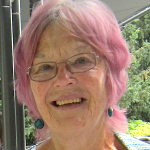
Pam Job helped run Poetry Wivenhoe for 10 years. Her work is published in anthologies and in magazines. In 2018 she won the Cornwall Contemporary Poetry competition. She has won The Crabbe Competition twice. Her poem, ‘The Parcel’, was included in the oratorio The Affirming Flame, premiered at Snape Maltings in 2019.
Orford Ness: the almost island
This place manufactures winds, angles them
to meet the sea then shreds them on iron tripes
of ruins above soft green mouldings of grass.
Winds are filed in levels of ferocity
in vertical drawers in a library of elements.
Open a cupboard out fly sea-mists, yellow fogs.
Pipes try to run away – gas boys gas – through rusted
ducts, open mouths still shouting we know about death
and yes those could be meat hooks in the ceiling.
Poppies, bloody breath of the dead blown against
barbed wire, and all else we have left is geometry
in this barracks for owls where struts are roofed with rooks
at its end, an instrument made of sand to hold the sea.
There’s a muted luminosity in this fractal landscape
now light pales and all the day’s sequins are stripped away.
Pam Job
This Suffolk site was used for the secret development and testing of radar and armaments including nuclear weapons from WW1 until 1973.
Patricia Peters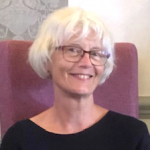
Patricia Peters lives close to a beautiful beach in Pakefield, Suffolk which has a thriving creative community.
Having attended several inspirational online poetry courses, she is preparing to publish a a pamphlet entitled ‘Tears. It will include ‘And Sing Like Alan’.
And Sing Like Alan
Alan got onto the stage
round, flat face, small eyes and nose
wanted to sing in his own language
no words, just a range of sounds
unchartered notes and unchecked volume
his own music bellowed in earnest
his tongue popping out between notes.
To the audience it was
wailing, howling, caterwauling
we were stunned, alarmed, some frightened
hands went over ears
an embarrassment of giggles
obvious cringes
tinges of anger
spoiling our afternoon.
Who let him onto the stage?
It shouldn’t be allowed!
Someone should do something.
But no one knew what to do
I didn’t know what to do, then
my dad joined Alan on stage
stood next to him,
put his arm around his shoulder
sung silently with him,
a spontaneous duet
a harmony so beautiful
that I cry remembering.
Stating my purpose, my mission
words diminish this example
not even poetry.
I want to be a woman like my father
and sing like Alan.
Patricia Peters
Caroline Gilfillan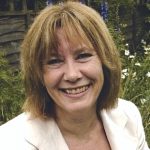
Caroline Gilfillan is the author of five poetry collections, one of which, Yes, won the East Anglian Book Award for the best poetry collection in 2010. Her work has appeared in many anthologies, and in 2019 she won the Yeovil Prize for Poetry. She also writes fiction and songs. Though no longer resident in East Anglia, she retains strong links with Norfolk and Suffolk and is a frequent visitor.  www.carolinegilfillan.co.uk
Things he loved
Her transparency; the clear breath
that ran through her; her nose –
the tidy fold of it, like paper; her innocence:
here was a woman who knew nothing
of ripe figs dripping juice, nothing
of sway-backed donkeys and Herodotus.
Not that she was stupid: she’d grown herself
from her own seeds, like a child raising
mustard and cress on blotting paper.
Like him, she’d been given nothing
and had made something of it.
He liked her will: she’d not buckle
or bend. And he loved the centre of her voice:
sherbet in the lemon. Her eyes, too: blue-sky
blue, limpid with chalky loss, a foil
for his, the colour of peat. Most of all
he loved her fastidious ways and words.
Those harridans in black habits had tied her
up in a parcel of plain brown paper
and string he wanted slowly to undo.
Caroline Gilfillan
Caroline Price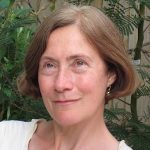
Caroline Price is a violinist and teacher by profession but writing has always played a significant part in her life. Her poems have appeared widely in literary magazines and anthologies, and she has published four collections, most recently ‘Picnic on the rocks, with frog’ (Shoestring Press 2017).
This poem won First Prize – 2018 Crabbe Memorial Competition.
Chamber Organ
Castle Grant, 1766
They lie back replete
in their padded seats, bibs spotted
from dismantling the birds they shot earlier
and prepare for the magic he’s promised, their host
tiny at the acanthus-swagged mahogany,
his hands as they dance
between octaves and stops
shaking the hall with a fanfare
engulfed moments later by thunder, followed as abruptly
by the eerie floating of a single flute
while on the far side of the wall and braced against it
his servant pumps the handle
without pause, gasping
as he gives the instrument breath,
his grunts and sweat-streaked face
as invisible, impossible to imagine
as the deer grazing in the dusk
or the soft chuck chuck
of a roosting pheasant, an answering grouse.
Caroline Price
David Healey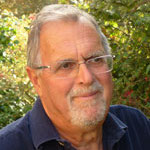
David Healey was born in 1944 and brought up in Cornwall. He qualified as a doctor at Guy’s Hospital and subsequently worked in Papua New Guinea before returning to become a GP in Suffolk. He’s been involved in wildlife conservation and helping to look after his grandson, Archie, who has cerebral palsy. He’s published two collections: of poetry: Slowing the Afternoon Down and Sleeping Among Yaks. A Wild Swan Feed At Welney won first prize in the Crabbe Poetry Competition in 2014.
A Wild Swan Feed At Welney
After the kerfuffle of reaching
the viewing chamber, making sure
the children with additional needs
don’t get lost or left behind
the swans fly towards us,
strung out like a wavering horizon,
glide down and carve Vs of curved
spray as they water ski to a stop.
The children laugh and cry, call
across to each other, answer back.
Soon as grain is thrown
from a barrow the swans converge
snatch and swallow what they can,
near enough for us to see
each adult bird has a wedge
of yellow on its bill.
There’s bugling and honking
on the lagoon. Most are Whoopers
though the warden in his spiel
informs us Bewick swans
are seen better from East Hide.
It’s a rumpus when they take off:
smack smack against water
as they struggle to get airborne.
Archie, my grandson, can’t stand
without splints and hand rails
but flapping his arms like wings
he gives me the lift I need just now.
Pools of sunlight and cloud shadow
sweep across The Ouse Washes.
When I hold him at the window
he laughs at where he is in the sky.
David Healey
Phil Baker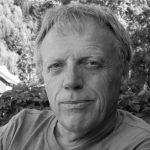
Phil Baker is of mixed European heritage РGerman, English, French, Polish. He lives in a barn near the Suffolk hamlet of Edwardstone and reads regularly at Arlingtons poetry caf̩ in Ipswich. His poetry has been published in anthologies and in the New European.
Mia and the ant– Commended, George Crabbe Poetry Competition 2019. Published in the Suffolk Poetry Society Anthology.
Mia and the ant
As if she’s been charging her batteries for the whole
of her three years
she seizes the day by both shoulders
looks it in the eye and says play!
Runs everywhere. Walking
she’s in danger of leaving herself behind
so she runs to keep up – slowing only when stalking
the moment
Fearless she attacks every climb, every crawl
the playground can offer, with squeals of pure joy
the excitement of putting her all
into meeting each challenge
At times, gaze elsewhere, she’s on auto-pilot
Her feet are left to their own devices
and she staggers, inadvertently almost splicing
her legs, grabs for balance, mutters -That was close
A rope bridge a foot above the ground
is negotiated with the same skill, not looking down
as I imagine her – fifty feet up and inching
not flinching for a moment – just the hint of a frown
above spuming white foam, a rock-strewn torrent
Ropes treacherous, slippery with humidity and slime
somewhere in the wilds of twenty years’ time
Re-crossing a tree trunk
she previously took in her eager stride
she encounters an ant. And stops. Looks.
Rooted to the spot – interrogates it
wordlessly
Nothing can persuade her to cross now
Whether fear of trampling it into the bark
– care for a tiny life easily lost
to restless feet with lives of their own
Or perhaps a more primitive fear
– of an alien creature. With too many legs.
No power of speech, yet the freedom to decide where it wants to go
without any apparent parental control
Earlier she’d asserted with unshakeable certainty
that she hadn’t come out of her Mummy’s tummy
Where from then? She’d laughed as she ran away
calling over her shoulder – I just came from yesterday
Now, faced with tomorrow with six legs, she’s stumped
But only briefly. Shelving the question, to avoid the congestion
on the tree-trunk route, she jumps off
feet first into today
Phil Baker
John Vaughan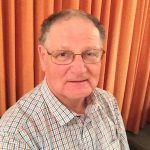
After a working life in local government John attended an evening class on creative writing in 2003. He fell in love with poetry, attended all the adult education classes he could and then obtained a degree from The Norwich Art School. He has published three pamphlets.
Watch His Lips
Faced with a choice of the ventriloquist or his dummy,
I like the dummy. His eyes are brightly alive whereas
the ventriloquist seems self absorbed. I say seem
because he doesn’t say much. Besides, the dummy has
the gift of the gab and smiles. The ventriloquist cuts
only a flinty grin. It is as if he is still struggling
to remember his lines. Meanwhile the dummy works
the audience, tells jokes and shares anecdotes.
With him we are at ease.
It doesn’t matter that he isn’t politically correct,
often direct, and says things as he finds them.
Sometimes he insults us, calls us names and swears.
We feel we can trust him. And when he speaks to us
in confidence he winks, deliberately lowers his voice
to keep the ventriloquist from hearing anything
he shouldn’t. We can’t help but think if he would drop
the man altogether and stand for Parliament, then
we could vote for him.
John Vaughan
Colin Hughes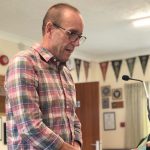
Colin lives in a no-man’s land between Dunwich and Walberswick on the Suffolk coast, where he garners most of his poetry ideas from birds and sand and sea and gorsey heath, and his increasingly elusive memories. He has published in various magazines, including The Rialto, South, Magma and Southlight, among others.
For the Birds
I Magpies
absurdly-shirted villains
spill onto pastures and pavements
in threes and fives and nines
like loony toons, or comic hooligoons,
yacking their consonant cackle
ragpie, slagpie, snagpie, shagpie,
hagpie, bagpie, lagpie, nagpie
glossy mag grackles,
who recklessly presage
woe or wealth, birth or bliss,
with numerical prank predictions
bawled in black and white
pumped-up politicos, platform foppets
in rented tails and tuxedos,
who strut over mud to blot their copy,
beak-tweak their undies in public
and thieve our bauble beliefs
with their crack-pot promises
put paid to you, plaguepies!
II Spanish Sparrows
scram, cheap cheep
chatter chappies,
you cavalier café crowd,
bitchy boyband bohemians,
crumb-snatching crust-snatchers,
scrappy-happy snitches,
dimwitted dandies
and panhandling pimpsters –
be done, belief-beggared busybodies
beady-eyed braggarts,
tale-telling townies –
scoot, you natty zapatistas,
puffed up pesetas,
fluffed-up muffins
with hussy cousins
and tatty tanned sisters –
clap! the prattle-pack scatters,
Colin Hughes



